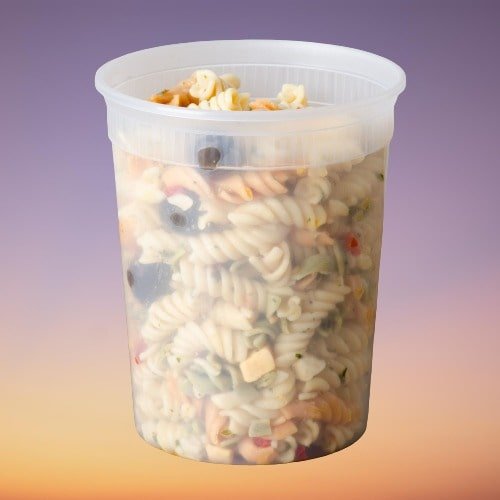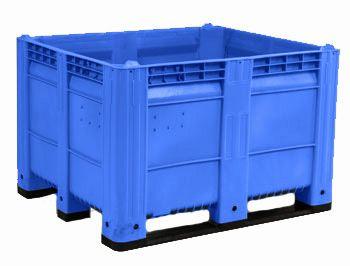A Comprehensive Overview to the Different Sorts Of Bulk Plastic Containers Available Today
Bulk plastic containers play a vital function in numerous industries, supplying options for storage and transport. Their diverse types deal with various needs, from rigid options for strong products to versatile containers suiting different shapes. Each type presents distinctive benefits, making it necessary to understand their applications and attributes. As markets progress, so do the needs for effective container services. What elements should one consider when picking the right bulk container?
Summary of Bulk Plastic Containers

Kinds of Mass Plastic Containers
Bulk plastic containers can be found in various forms, each suited to certain applications. Rigid bulk containers, versatile bulk containers, and intermediate bulk containers represent the main categories, each offering distinct benefits. Understanding these kinds is important for choosing the ideal container for moving and saving products.

Stiff Bulk Containers
Rigid bulk containers are vital for reliable storage space and transportation of various materials across markets. These containers are typically constructed from resilient plastics, enabling them to hold up against severe handling and environmental conditions. They are available in numerous forms and sizes, including totes, containers, and drums, making them ideal for storing every little thing from granular materials to liquids. Stiff containers typically feature enhanced wall surfaces and safe lids, ensuring the contents continue to be secured during transportation. Their stackable style maximizes storage room, making them suitable for storehouses and manufacturing centers. Furthermore, numerous rigid bulk containers are multiple-use and recyclable, adding to sustainability initiatives. Generally, their robustness and adaptability make rigid bulk containers a vital element in supply chain operations.
Flexible Mass Containers
Adaptable bulk containers, frequently referred to as adaptable intermediate bulk containers (FIBCs), work as a functional service for saving a selection and delivering of completely dry products. These containers are normally made from woven polypropylene and are developed to be light-weight yet solid, enabling effective handling and stacking. Their flexibility allows them to accommodate different sizes and shapes, making them appropriate for items ranging from grains to chemicals. FIBCs can be furnished with features such as spouts for simple dental filling and discharge, in addition to protective layers for enhanced resilience. Additionally, they are recyclable and multiple-use, adding to sustainable methods in markets such as farming, food handling, and construction. Overall, adaptable mass containers provide a cost-efficient and reliable alternative for bulk material administration.
Intermediate Mass Containers
Intermediate bulk containers (IBCs) are important for the effective transportation and storage of liquids and granular products across numerous industries. These containers normally have an ability ranging from 275 to 330 gallons and are developed for simple managing and piling. Made from sturdy materials like high-density polyethylene or steel, IBCs supply exceptional protection against contamination and environmental aspects. Their layout consists of features such as a built-in pallet for forklift access and a detachable top for very easy dental filling and cleaning. IBCs are commonly used in chemical, food, and pharmaceutical industries, guaranteeing compliance with safety laws. Their convenience and reusability make them a cost-effective service for bulk storage space and transport, adding to supply chain efficiency and sustainability.
Features and Benefits of Bulk Plastic Containers
Mass plastic containers are essential tools in numerous markets, providing a combination of toughness and usefulness. These containers are built from premium materials, making them resistant to impacts, chemicals, and environmental variables. This effectiveness guarantees item safety during storage and transportation.
Furthermore, bulk plastic containers are light-weight, assisting in convenience of handling and minimizing delivery prices. Their stackable design takes full advantage of storage space performance, allowing for maximized stockroom room. Several designs include secure lids or closures, supplying an airtight seal that prevents and protects materials contamination.
Mass plastic containers are typically recyclable and recyclable, adding to sustainable methods. Their flexibility permits a large array of applications, from food storage to commercial usage, enhancing their worth across fields. Companies gain from the lengthy life expectancy and reduced upkeep demands of these containers, making them a cost-effective service for both short-term and long-term requirements.
Industries That Utilize Bulk Plastic Containers
Numerous markets take advantage of using mass plastic containers, each leveraging their one-of-a-kind residential properties for details applications. The food and drink market relies upon these containers for secure storage space and transportation of items, while the chemical manufacturing sector utilizes them for managing hazardous materials. Furthermore, the pharmaceutical distribution needs highlight the importance of sturdiness and tidiness in product packaging services.
Food and Beverage Industry
As the demand for effective and safe storage solutions remains to climb, the food and drink sector increasingly counts on bulk plastic containers for their functional needs. These containers give durable, lightweight, and flexible choices check out this site for keeping components, completed products, and waste products. Made from food-grade products, they assure conformity with health and wellness and safety requirements. Different designs, such as stackable bins and carry boxes, maximize area during transportation and storage, enhancing logistical performance. Furthermore, the openness of some bulk containers permits very easy supply management, reducing the danger of wasting. With the sector's concentrate on sustainability, several producers are currently providing recyclable and recyclable alternatives, lining up with environment-friendly techniques while fulfilling the high demands of food safety and hygiene.
Chemical Production Industry
The chemical production sector depends heavily on bulk plastic containers for the effective and secure storage of basic materials, intermediates, and finished products. These containers are made to hold up against different chemicals, ensuring that harmful products do not leak or weaken the container itself. Common kinds include high-density polyethylene (HDPE) and polypropylene containers, which use outstanding chemical resistance and durability. Their lightweight nature and stackable layout assist in transportation and storage, maximizing space in manufacturing facilities. Furthermore, lots of mass plastic containers feature features such as tamper-evident seals and easy-to-read labeling, enhancing security and compliance with industry policies. Generally, mass plastic containers are integral to the chemical manufacturing procedure, providing reputable options for taking care of diverse compounds.
Drug Circulation Demands
Drug circulation counts on bulk plastic containers to fulfill rigorous safety and regulatory demands. These containers are vital for storing a variety and transferring of pharmaceutical products, including active pharmaceutical ingredients (APIs) and ended up drugs. Their design guarantees protection against dampness, light, and contamination, preserving the stability of sensitive materials. In addition, mass plastic containers are certified with market criteria such as Great Manufacturing Practices (GMP) and are frequently made from materials that are FDA-approved. Making use of these containers improves efficiency in the supply chain, allowing for secure, massive distribution while minimizing waste. Firms in the pharmaceutical market prioritize making use of resilient, leak-proof, and tamper-evident containers to assure product safety and security and high quality throughout the logistics process.
Factors to consider for Selecting the Right Container
When picking the proper bulk plastic container, numerous elements must be meticulously evaluated to assure excellent performance and safety and security. The nature of the products to be kept is extremely important; compatibility with the container's material can affect stability and safety and security. Bulk Plastic Containers. In addition, the container's shapes and size need to align with the storage and transport requirements, guaranteeing efficient area application
Lots capacity is one more vital consideration, as it needs to accommodate the weight of components without threat of damage or failure. The layout features, such as airing vent or covers, can affect functionality and access. Compliance with sector policies is crucial, especially in markets like pharmaceuticals, where safety criteria are stringent.
The expected life expectancy and toughness of the container ought to be assessed to validate it meets the operational needs without regular substitute. By reviewing these aspects, one can choose the most ideal mass plastic container for particular applications.
Environmental Effect and Sustainability
As organizations increasingly prioritize sustainability, the ecological influence of mass plastic containers has actually come under scrutiny. These containers, frequently made from materials such as polyethylene or click this polypropylene, contribute significantly to plastic waste otherwise handled correctly. Their production involves the consumption of nonrenewable fuel sources, which can bring about raised greenhouse gas exhausts. Developments in recycling modern technology and the advancement of naturally degradable options are helping to minimize these worries.
Lots of manufacturers are embracing methods that stress the use of recycled products, consequently reducing the need for virgin plastics. The sturdiness of mass plastic containers likewise plays a duty; they are developed to be reused multiple times, which can reduce their total environmental impact when contrasted to single-use choices. Ultimately, the industry faces the obstacle of balancing functionality with ecological duty, making sustainable techniques vital for the future of mass plastic containers.
Ideal Practices for Storage and Transportation
Effective storage space and transport of bulk plastic containers significantly influence both functional performance and sustainability. To take full advantage of room, companies must pile containers safely, ensuring security and preventing damage. Proper labeling is necessary for easy identification, which enhances retrieval procedures. In addition, keeping a tidy and well organized storage area lowers the threat of contamination and enhances security.
For transportation, selecting the right lorry is essential; containers must be protected to stay clear of changing during transit. Firms must additionally think about utilizing pallets to facilitate less complicated loading and unloading. Normal assessments of containers for damage can prevent pricey replacements.
Temperature level control is one more important aspect, as extreme problems can jeopardize the honesty of the plastic. Ultimately, training workers on finest techniques for dealing with and transport warranties compliance and advertises a culture of security. By implementing these finest practices, organizations can improve their operational efficiency while adding to ecological sustainability.
Often Asked Questions
How Do I Tidy Mass Plastic Containers Efficiently?
To tidy mass plastic containers effectively, one ought to rinse them with cozy water, utilize a moderate cleaning agent and scrub with a soft brush. Rinse completely, after that enable to air completely dry entirely before storage space or reuse.
What Is the Life Expectancy of Mass Plastic Containers?
The lifespan of mass plastic containers normally ranges from 5 to one decade, depending upon the product, usage, and ecological problems. Correct upkeep and storage can substantially extend their functionality and durability in time.
Can Mass Plastic Containers Be Custom-made?

Do Bulk Plastic Containers Have Warranty Options?

Exist Laws for Using Bulk Plastic Containers?
Yes, policies exist for making use of mass plastic containers, mainly concentrated on safety and security, environmental effect, and material conformity. These policies guarantee that containers satisfy industry standards and appropriate for transporting various substances safely and effectively.
Inflexible bulk containers, versatile mass containers, and intermediate mass containers stand for the key classifications, each offering one-of-a-kind benefits. Versatile mass containers, frequently referred to as versatile intermediate mass containers (FIBCs), offer as a versatile remedy for transporting and saving a variety of completely dry products. The chemical manufacturing sector relies greatly on mass plastic containers for the efficient and safe storage space of raw materials, intermediates, and completed items. bulk plastic containers for sale. These containers are created to withstand various chemicals, guaranteeing that unsafe products do not leakage or break down the container itself. Additionally, bulk plastic containers are compliant with sector standards such as Great Production Practices (GMP) and are often made from products that are FDA-approved